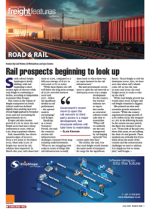Avemel Logistics has significantly expanded its operational footprint with the launch of a state-of-the-art logistics park in New Germany, Durban, as it gears up to meet growing demand for specialised freight services across South Africa and beyond.Purpose-built to handle heavy-duty and abnormal cargo, the new facility features dedicated infrastructure for the handling of steel coils, steel plates, and other industrial materials.According to CEO Aven Naidu, the park forms part of a broader strategy to strengthen the company’s presence along key logistics corridors and enhance service delivery to industrial, construction and manufacturing sectors.“We have also established container handling depots in Durban and Johannesburg to streamline inland and coastal logistics, and deployed local f leets in Durban, Johannesburg and Cape Town to ensure regional responsiveness and service agility,” said Naidu.Avemel has also upgraded its entire f leet to be fully compliant with the transport of hazardous and refrigerated cargo. This is backed by the implementation of advanced real-time tracking systems, ensuring full visibility and safety for high-risk, high-value containers.While the company remains primarily road-focused, it is actively exploring future rail partnerships in line with anticipated improvements in South Africa’s rail infrastructure. Naidu said intermodal freight – particularly for bulk, agricultural, and cross-border cargo – held strong potential, provided that national rail reforms gained momentum.In line with its regional growth ambitions, Avemel is also expanding into neighbouring markets, with a new office set to open in Harare, Zimbabwe.“Avemel Zimbabwe will spearhead our cross-border operations, allowing us to offer clients full supply chain solutions into Africa,” Naidu said.The company’s investments come at a time when the logistics sector is under increasing pressure to adapt to evolving market demands and operational hurdles.“Rising fuel costs, growing expectations around last-mile delivery, and the increasing push for lower emissions are all reshaping road freight dynamics,” said Naidu. “But one of the biggest ongoing challenges is the deterioration of road infrastructure. Security risks are also escalating, with rising incidents of cargo theft and hijackings driving up insurance costs, especially for high-value freight.”He said that while momentum was building around rail revitalisation and public-private partnerships, significant barriers remained. “There’s a real push toward intermodal freight solutions, but rail still has a long way to go before it can claim a reliable role in the logistics mix. Issues such as inconsistent service schedules, limited terminal access, poor last-mile connectivity and ageing infrastructure are all still very much in play.”As a result, road freight continued to dominate due to its f lexibility and responsiveness, he said. Naidu remains optimistic about the outlook for freight operators, pointing to major growth opportunities in specialised cargo handling, particularly hazardous materials, refrigerated freight and abnormal loads.He said continued growth in FMCG and construction bode well for the logistics sector. LV

